Archbishop's addresses translated for Islamic audiences
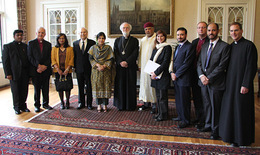
Tuesday 9th October 2012
The Archbishop of Canterbury, Dr Rowan Williams, today launched the first collection of the his lectures to be translated for Islamic audiences.The two collections which include lectures delivered in Cairo, Islamabad and Libya have been translated into Urdu and Bangla, and come in advance of further translations into Arabic, Hausa and Swahili.
The Archbishop was joined by Dr Abdulkarim Khalil, the Secretary General of the World Islamic Call Society, Baroness Sayeeda Warsi and Professor Mona Siddiqui, who delivered speeches to recognise the Archbishop’s role in the last decade of Christian Muslim dialogue.
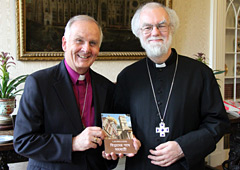 Barry Morgan, Archbishop of Wales, introduced the event on behalf of Archbishop Michael Jackson, the Archbishop of Dublin, and spoke about the Global Anglican Communion’s positive relationships with the Muslim world, and the particular contribution of Archbishop Rowan Williams, who has spoken about the central aspects of Christianity to Muslim audiences in the lectures which have been translated into these volumes.
Barry Morgan, Archbishop of Wales, introduced the event on behalf of Archbishop Michael Jackson, the Archbishop of Dublin, and spoke about the Global Anglican Communion’s positive relationships with the Muslim world, and the particular contribution of Archbishop Rowan Williams, who has spoken about the central aspects of Christianity to Muslim audiences in the lectures which have been translated into these volumes.
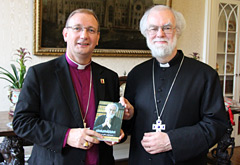
Bishop Mark Davies, Bishop of Middleton, spoke about the Urdu translation and the link between Lahore and Manchester. Archbishop Michael Jackson, Archbishop of Dublin, spoke on behalf of Network for Inter faith Concerns of the Anglican Communion, and was with the Archbishop on visit to Pakistan where he delivered one of the lectures in the collection.
The Global Director of the Co-Exist Foundation, Tareq Elgawhary, brought greetings from the Grand Mufti of Egypt, Dr Ali Gomaa who thanked the Archbishop for his “courage and guidance during these difficult years and helping to build bridges of understanding Christians and Muslims”.
“You have been an outspoken advocate for the need to be more literate of other religions, more tolerant and accepting of other faiths and more hopeful for a better future – all injunctions that are at the core of the teachings of both Christ and the Prophet Mohammed (peace and blessings be upon them both)”.
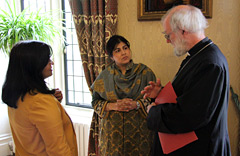 Baroness Sayeeda Warsi spoke about how the Archbishop has enhanced the relationship between Christians and Muslims in the UK and abroad.
Baroness Sayeeda Warsi spoke about how the Archbishop has enhanced the relationship between Christians and Muslims in the UK and abroad.
“When it comes to the position of faith in Britain, you could say that the Archbishop and I are singing from the same hymn sheet. We have a common foe – aggressive, intolerant secularisation - and we have a common belief in freedom of religion, and the freedom to express that religion”.
She went on to say how the Archbishop was deemed radical when he called for Muslims to be able to wear a headscarf, just as she was attacked when she argued that Christians should be able to wear a crucifix.
“A Christian standing up for Muslims, and a Muslim standing up for Christians - But the fact is, that we are all standing up for faith”.
“When the Archbishop is reaching out to the Muslim world, he’s showing that our different faiths do not divide us, but ensure that language does not divide us also. For just as St Jerome brought the bible to the general public by translating it, so too you are bringing the messages of religious freedom, tolerance and progress to millions more people.”
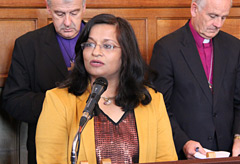 Professor Mona Siddiqui spoke about the Archbishop’s contribution to Christian Muslim relations over the last decade, reflecting on the conversations that the Archbishop has held around Islam. She spoke of the importance of the Building Bridges Seminars for dialogue, a series which has been chaired ‘thoughtfully and effectively’ by Archbishop Rowan who changed speaking in dialogue to listening in dialogue’ and ready conviction for a readiness for learning and pomp and ceremony to friendship and graciousness, and she described the way in which the Archbishop had ‘inspired and maintained loyalty amongst those who met him, who learnt from him and with him, who joked with him and shared an intellectual intimacy with him, and who despite all informalities have held him in the upmost esteem.”
Professor Mona Siddiqui spoke about the Archbishop’s contribution to Christian Muslim relations over the last decade, reflecting on the conversations that the Archbishop has held around Islam. She spoke of the importance of the Building Bridges Seminars for dialogue, a series which has been chaired ‘thoughtfully and effectively’ by Archbishop Rowan who changed speaking in dialogue to listening in dialogue’ and ready conviction for a readiness for learning and pomp and ceremony to friendship and graciousness, and she described the way in which the Archbishop had ‘inspired and maintained loyalty amongst those who met him, who learnt from him and with him, who joked with him and shared an intellectual intimacy with him, and who despite all informalities have held him in the upmost esteem.”
In conclusion, Dr Rowan Williams responded to the speeches, and thanked those involved in translating his lectures despite a style of writing which he has been told is ‘not wholly clear to every reader’.
The Archbishop said that part of what has strengthened Christian-Muslim dialogue in the UK is a ‘real willingness and eagerness to understand one another’.
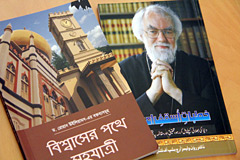 “We have throughout our histories as Christians and Muslims, had periods where both of us are quite sure of what the other one thinks, so sure that we don’t need to ask them, which is never a good place to be. It was quite early in the Middle Ages that a Benedictine abbot in France commissioned the first translation into Latin of the Qur’an because he believed he needed to understand how Muslim neighbours really thought about God and prayed to God. That task of entering into the mind of the other, sometimes trying to express our belief in words that will make sense to the other, that creative and challenging work is an essential part of what we seek to do together.”
“We have throughout our histories as Christians and Muslims, had periods where both of us are quite sure of what the other one thinks, so sure that we don’t need to ask them, which is never a good place to be. It was quite early in the Middle Ages that a Benedictine abbot in France commissioned the first translation into Latin of the Qur’an because he believed he needed to understand how Muslim neighbours really thought about God and prayed to God. That task of entering into the mind of the other, sometimes trying to express our belief in words that will make sense to the other, that creative and challenging work is an essential part of what we seek to do together.”
“If the lectures that I’ve given and the addresses I’ve crafted over the last ten years have at least helped to point in the right direction of what ought to be done, even if they’ve not always succeeded in doing it, then I shall not have wasted my time.”
